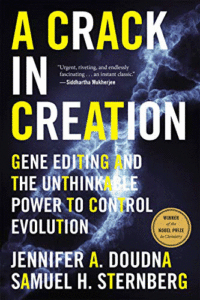A Crack in Creation
 I recommend Jennifer Doudna’s A Crack in Creation: Gene Editing and the Unthinkable Power to Control Evolution. In 2020, Doudna and Emmanuelle Charpentier were awarded the Nobel Prize in Chemistry for their recent work discovering and developing the CRISPR-Cas9 gene-editing technology. Prior to winning the award, Doudna co-authored A Crack in Creation with her former Ph.D. student, Samuel Sternberg. The book is important for a multitude of reasons, but most importantly, for the impact the CRISPR-Cas9 technology will have (and is already having) on the way we humans interact with and control both our natural environment and our own genetic future.
I recommend Jennifer Doudna’s A Crack in Creation: Gene Editing and the Unthinkable Power to Control Evolution. In 2020, Doudna and Emmanuelle Charpentier were awarded the Nobel Prize in Chemistry for their recent work discovering and developing the CRISPR-Cas9 gene-editing technology. Prior to winning the award, Doudna co-authored A Crack in Creation with her former Ph.D. student, Samuel Sternberg. The book is important for a multitude of reasons, but most importantly, for the impact the CRISPR-Cas9 technology will have (and is already having) on the way we humans interact with and control both our natural environment and our own genetic future.
In the first half of the book, Doudna takes the reader on an exciting journey of scientific discovery! She revisits the experiences that ultimately led her to discover the CRISPR-Cas9 system while also providing a brief history and explanation of gene-editing technologies up to and including CRISPR-Cas9. If you haven’t taken biology and chemistry in a while, don’t fear! The explanations are written for the general public, so although you may find yourself googling a few technical terms here and there (I did!), Doudna’s writing style makes it fairly easy to follow along.
In the second half of the book, once the reader understands how CRISPR-Cas9 works, Doudna moves on to discuss the ethical implications of the technology—the good, the bad, and the ugly. She describes the way ethical and policy issues emerged from immediate, widespread use of the technology she had discovered. As a scientist who was originally quite far removed from science policy discussions, Doudna shares her evolving perspective on the responsibility of scientists to engage in the development of ethics and policy related to their work.
This timely book is crucial reading for any college student! The impact that CRISPR-Cas9 technology has already made on the world is breathtaking, and its future impact pushes human imagination to the limit. As Doudna puts it, “gene-editing technology gives us a chance to hold an informed public discussion about how we want to use CRISPR’s most far-reaching power: the ability to control the future of life. But if we wait too long, we may find that the reins have slipped from our hands.” —Heidi Hendrickson, assistant professor of chemistry